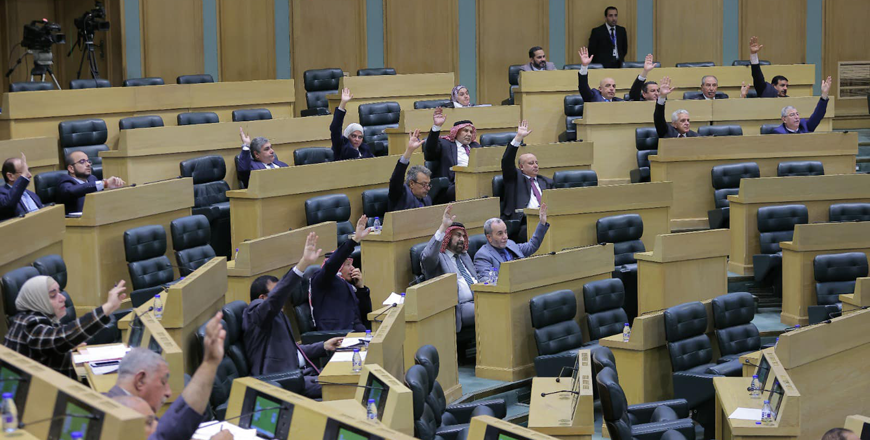You are here
Royal Court adopts professional code of conduct for senior officials
By JT - Jul 09,2017 - Last updated at Jul 09,2017

AMMAN — Upon directives from His Majesty King Abdullah, the Royal Court has adopted a professional Code of Conduct for its senior officials, advisers and directors, in an effort to enhance work procedures, a Royal Court statement said.
The code builds on existing legal and regulatory frameworks currently implemented under national integrity laws, with the aim of bolstering commitment to them, embodying the status of the Royal Court as a model for public institutions in good governance, integrity, transparency, and accountability at the highest institutional and professional standards, the statement said.
The code’s adoption aims at strengthening the system of professional conduct governing the work of the court’s employees and to enhance its performance, in accordance with the principles of integrity, transparency and accountability.
The code includes a central article on “Full Financial Disclosure”, which ensure the comprehensiveness of disclosure, encompassing the spouses and children of the Royal Court’s senior officials, advisers and directors, according to the statement.
The financial disclosure provisions require officials to submit bank statements and statements of property disclosing their moveable and immoveable assets inside and outside the country to the department responsible for ensuring compliance within the Royal Court, the statement added.
Financial disclosure provisions also stipulate that “officials must disclose their membership on company boards, or their involvement in any commercial or financial venture, prior to their appointment”.
The code also focuses on issues of confidentiality and conflict of interest, requiring officials “to immediately disclose any conflict that arises involving their personal interest and that of the public” and ensuring that “public interest must come first when resolving the conflict”.
Officials are also not allowed to use their official capacity or the information they obtain while undertaking their duties to further their personal or financial interests or those of their families, friends, close associates, or their areas of origin or residence, read the statement.
In addition, the code stipulates that officials must avoid establishing close relationships with individuals or institutions whose interests primarily hinge on their decisions, the statement said.
Officials are also required to maintain the confidentiality of official information and documents they obtain in the course of their work, be they in written, oral, or electronic form. They must not disclose them to others, unless required by law, professional duties, or court.
Under the code’s provisions, officials must also refrain from using classified or unannounced information they are privy to in the course of their work for personal or financial gain, or to benefit their families or any other person.
Upon leaving office, officials must also “pledge not to pursue personal gain through information that is not publicly available and had been obtained while in office. They must not utilise or disclose unannounced information that was available to them while in office for any whatsoever reason, and otherwise must be held legally liable”.
Other similar obligations that extend beyond leaving office require officials to “refrain, for the duration of one year from the date of leaving office, from working with or providing counsel to any internal or external party with financial or contractual relations with the Royal Hashemite Court that works within the scope of responsibilities previously assigned to the officials while in office, except in the case of acquiring a written approval from the relevant responsible party at the Royal Court”.
Moreover, the Code of Conduct includes a number of general provisions that strengthen integrity and ensure the performance of duties honestly, accurately, professionally and impartially.
“Officials must refrain from using public office to interfere directly or indirectly in the hiring of any person for a permanent or temporary job in the private or public sector by overstepping relevant procedures and principles,” the code stipulates.
The code also requires officials to “commit full-time to undertaking their duties; withdrawing from any other professional practice or business; and refraining from offering services to any other party with or without pay if that does not fall within officialy required duties”.
The provisions also require that officials “maintain transparency, integrity and fairness when appointing, promoting, training, rewarding, evaluating, transferring, or seconding employees, or taking any other measures thereof, based on merit and competitiveness, and without any biases related to family, friendship, or gain and any discrimination on the basis of gender, ethnicity, age, or religion”, the statement concluded.
Related Articles
AMMAN — Upon directives from His Majesty King Abdullah, the Supreme Commander of the Jordan Armed Forces-Arab Army (JAF), and after follow-u
AMMAN — The Lower House on Wednesday continued deliberations over the draft amendments for the Right to Access Information Law, endors
AMMAN — Journalists and activists on Monday expressed their dismay and frustration over the passing of the draft amendments for the Right to














